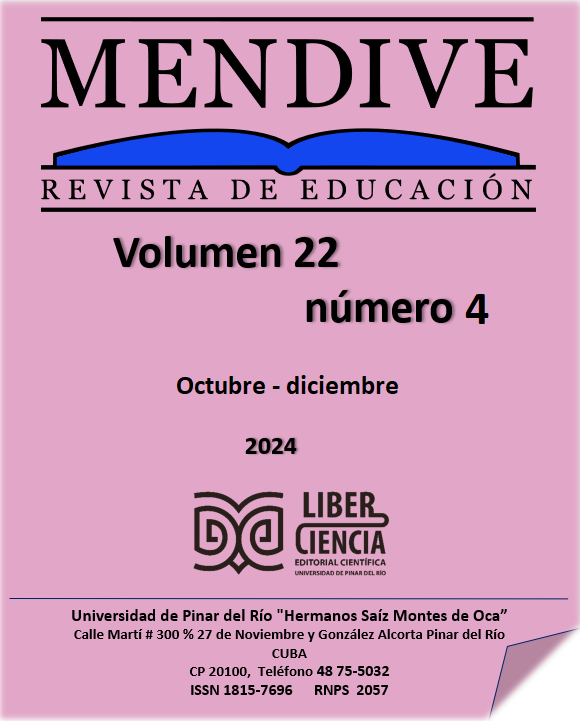Activities for the development of phonemic hearing in the prevention of language disorders
Main Article Content
Abstract
In the production of language, the verbal motor and auditory-verbal analyzers play a crucial role, which together guarantee the successful generation of language. Within the framework of elements that intervene in this complex process, various neuropsychological factors have been identified, among which is phonemic hearing. The role played by phonemic hearing in the analysis and synthesis of language signs will allow the acquisition of oral and written language, so it is necessary to consider the possibilities of preventing language disorders from its adequate and timely stimulation. The objective of this work is to socialize the results achieved with the elaboration and application of activities for the development of phonemic hearing in children of the fifth year of life. For the execution of the aforementioned study, different research methods were used such as: analysis-synthesis, inductive-deductive, modeling, ppedagogical testand pre-experiment, which allowed the design and application of these activities with the objective of developing children's phonemic hearing and preventing language disorders in children in their fifth year of life in the nursery school. The activities were applied systematically within the educational process of the aforementioned year and the existence of progress in the development of phonemic hearing of the children studied was confirmed, since the errors detected in the initial evaluation decreased significantly, which shows the effectiveness of the applied activities.
Downloads
Article Details

This work is licensed under a Creative Commons Attribution-NonCommercial 4.0 International License.
References
Bonilla Sánchez, M. d. R., Solovieva, Y., Méndez Balbuena, I. & Díaz Ramírez, I. (2019). Efectos del juego de roles con elementos simbólicos en el desarrollo neuropsicológico de niños preescolares. REVISTA DE LA FACULTAD DE MEDICINA, 67(2), 299-306. http://dx.doi.org/10.15446/revfacmed.v67n2.65174
Calzadilla González, O., González Picarin, A., & Mendoza Cevallos, A. d. R. (2023). Fundamentos de una concepción pedagógica de atención logopédica a escolares de la educación primaria. Luz, 22(1), 15-24. http://scielo.sld.cu/scielo.php?script=sci_arttext&pid=S1814-151X2023000100015
Feld, V. (2014). Las habilidades fonológicas, su organización neurofisiológica y su aplicación en la educación. Pensamiento Psicológico, 12(1), 71-82. https://doi.org/10.11144/Javerianacali.PPSI12-1.hfon
González Reyes, A., Fuentes Figueredo, O., & Socarrás Aguilar, L. (2019). El aprendizaje desarrollador: una necesidad para la lengua española en el primer grado de la educación primaria. Revista Atlante: Cuadernos de Educación y Desarrollo. https://www.eumed.net/rev/atlante/2019/01/aprendizaje-desarrollador.html
Labrada Batchelor, L. d. l. C., Batchelor Ramos, M. M., & Quintana Jiménez, R. M. (2021). La pronunciación en las niñas y los niños del grado preescolar; un reto actual para el logopeda. Dilemas contemporáneos: educación, política y valores, 9 (1). https://doi.org/10.46377/dilemas.v9i1.2834
Martínez Mendoza, F. (2004). Lenguaje Oral. Editorial Pueblo y Educación.
Pinango González, A. G., & Vega Castro, L. (2018). Estimulación auditiva como base para la adquisición y desarrollo del lenguaje Revista Caribeña de Ciencias Sociales. (abril 2018). https://www.eumed.net/rev/caribe/2018/04/estimulacion-auditiva-lenguaje.html
Sito Justiniano, L. M., & Vargas Quispe, G. (2019). Programa de desarrollo fonológico en las habilidades para el aprendizaje de la lectura en niños de cinco años. ConCiencia EPG, 4(2), 11-23. https://doi.org/10.32654/CONCIENCIAEPG.4-2.2
Solovieva, Y., Chanona, C., Quintanar Rojas, L., & Lázaro, E. (2009). Caracterización neuropsicológica del oído fonemático en niños indígenas bilingües. Revista CES Psicología, 2(2), 3-19. https://dialnet.unirioja.es/servlet/articulo?codigo=3179884
Torres Vidal, N. (2018). La prevención de los trastornos del componente fonético en los niños de la infancia preescolar. Revista Caribeña de Ciencias Sociales. https://www.eumed.net/rev/caribe/2018/11/trastornos-fonetico-ninos.html
Trujillo Dávila, A. J., Bonilla Santos, J., Flor, L. F., & Vargas, N. (2017). Efectividad de un programa de estimulación cognitiva a través del arte en niños con problemas de aprendizaje: un estudio piloto. Revista Electrónica "Actualidades Investigativas en Educación", 17(2), 1-22. https://dx.doi.org/10.15517/aie.v17i2.28679


